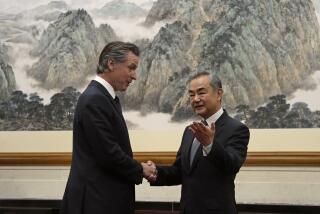China’s Elite Unfazed by Yuan Talk
- Share via
Disputes over China’s currency may be sparking protectionist sentiments in Washington. But Wong Kwong Yu, one of China’s wealthiest entrepreneurs, isn’t losing sleep over the matter.
Wong, the 35-year-old founder of GOME Group -- often called the Wal-Mart of China -- doesn’t think his fast-growing electronics empire will be hurt if China gives in to global pressure to revalue its currency, the yuan.
That’s because the billionaire operates in the Chinese economy, selling locally produced versions of foreign-brand televisions, cellphones and other products. He might even come out ahead, because 20% of the components in the products he sells are imported and would be cheaper if the yuan gets stronger.
However, Wong, who opened his first store in 1987 in his late teens and has built an empire of 330 stores in 80 cities across China, echoed his government’s complaint that the mounting U.S. pressure to revalue the Chinese currency could backfire, if the tensions escalate into a larger trade dispute.
“For the U.S. to try and influence [China] isn’t healthy for the U.S. or China,” said Wong, who is the richest or the second-richest man in China, depending on whether one believes Euromoney or Forbes magazine. “Of course, it seems like the U.S. always enjoys telling others what is the right thing to do.”
Wong’s views were echoed by other Chinese entrepreneurs who attended a business seminar in Los Angeles this week sponsored by the Asia Society. Their comments reflect the frustration of Chinese business and government leaders about the global pressures to revalue the currency, which is pegged at about 8.3 yuan to the U.S. dollar.
China’s competitors contend that the yuan is undervalued by as much as 40%, making Chinese exports cheaper in foreign markets and giving the country an unfair trade advantage.
Leaders in Beijing, who have accumulated massive foreign reserves trying to prop up the yuan, acknowledge that they need to move toward a more flexible currency. But, they say, they need to strengthen their financial system before making that move or they will risk destabilizing their economy.
China’s exchange-rate system is expected to be on the agenda this weekend when the finance ministers from the Group of 8 leading industrialized nations meet in London.
Tensions between the U.S. and China have escalated since the Jan. 1 removal of textile and apparel quotas, which led to a surge of Chinese exports to the U.S. and Europe. The U.S. has already imposed restraints on a number of Chinese textile products, and Europe announced Friday that it had reached a deal in which China agreed to restrict its exports of textile products over the next three years.
U.S. Federal Reserve Chairman Alan Greenspan and U.S. Treasury Secretary John W. Snow warned China recently that its fixed currency was a threat to global financial stability. Congress is considering a bill that would impose a 27.5% tariff on Chinese imports if officials in Beijing didn’t readjust the currency within six months.
Donald Tang, chairman of Bear Stearns Asia and organizer of the Asia Society conference, agrees that China needs to move toward a more flexible currency. But before that happens, he said, China needs to strengthen its heavily indebted banking system, bolster its financial expertise and put in place institutions to manage a flexible currency. In Shanghai, for example, the government is building a multi-currency trading system.
Pushing forward too quickly would expose China’s weak banking system to speculative pressures, Tang said. That was the scenario that played out in 1997, when an attack on the Thai baht led to the collapse of economies across Asia. At that time, China was praised by the U.S. and others for protecting its currency peg and preventing the financial contagion from spreading further.
Rather than “wasting precious time” trying to force China to adjust its currency or restrain its growth, the U.S. government should be encouraging its companies to increase their investment and sales in China, said Wong, who is expanding into real estate and securities.
Not that it will be easy, warned the entrepreneur, whose GOME superstores are credited with transforming the Chinese retail environment.
Traditionally, the electronics retail market in China has been dominated by small vendors that lack the brand and buying power of a large firm. The abundance of counterfeit goods also has made it hard for retailers to compete selling legitimate products.
Wong, the son of farmers from Guangdong province, said he was forced to find creative ways to cut costs because of a lack of capital. By dealing directly with manufacturers, GOME was able to offer consumers name-brand electronic goods at low prices. The company also used creative marketing techniques to lure customers into its stores, such as selling rice cookers for about $1 apiece, according to Chinese media reports.
China’s retail market is expected to grow more competitive in the coming months because the government is lifting restrictions on foreign retailers as part of its commitment to join the World Trade Organization. But Ira Kalish, director of research for Deloitte Services, said there was “plenty of low-hanging fruit” for an aggressive company like GOME.
Wong isn’t worried about standing up to competition from foreign giants such as Wal-Mart Stores Inc. and Best Buy Co., citing his much lower labor and distribution costs.
“People know GOME offers the best price,” he said.
More to Read
Inside the business of entertainment
The Wide Shot brings you news, analysis and insights on everything from streaming wars to production — and what it all means for the future.
You may occasionally receive promotional content from the Los Angeles Times.









